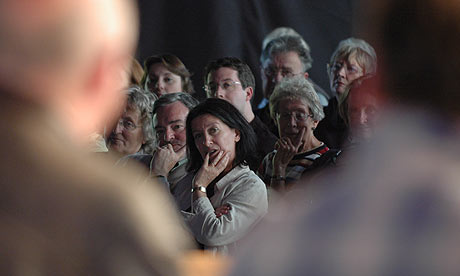
What all literary festivals are about, as well as meeting the authors and rummaging through the bookshops (and basking in the sun this year – hooray!) is being read to. Some people can't hear the written word enough, perhaps because it invokes memories of our earliest literary experience, that of the parent reading to us at bedtime, filling our sleepy heads with Gothic castles and death-defying escapes and Moomins that then swirled about in there after the light went out. Others, though, resent it, possibly for much the same reason, that it seems to return you to a helpless, infantile state where you couldn't just read books for yourself.
A pedantic friend tells me he only hears the moments where the reader hasn't caught the natural rhythm of a sentence, and so muffles its impact. The different voices readers feel constrained to do when reading the bits of dialogue only serve to reinforce the fact that we are being robbed of the chance of hearing two counterpointed voices in our heads, instead hearing them conflated into just the one.
I suspect most people don't agree with him. The sales of audiobooks are reliably buoyant, and not many seem to mind the tremendous abridgement that goes into putting a novel into spoken-word format. Some readings attained classic status long ago. Alan Bennett rendering Pooh or Alice is somehow a separate pleasure in its own right, while Tony Robinson's readings of Sir Terry Pratchett's works are the antidote to long stretches of motorway driving for others.
This might be the point, though. Does it help that we are very often hearing books on CD being read by familiar voices, the comforting, accessible tones of Prunella Scales or Richard Wilson, say, as opposed to the unmodulated drone or reedy hiccup of whoever happened to write it? If some authors are bad at reading their work, it's precisely because they're not actors and, despite whatever origins the literary arts may have in songs sung on the shores of the Aegean eight centuries before the Christian calendar, telling an audience what it says on the page in front of them isn't these days how it was meant to be transmitted.
Poets reading their own work can be a particular bugbear. The crackly, dry tones of Eliot reading The Waste Land don't work for me at all, but Sylvia Plath's bright, eternally youthful voice only makes her words all the sharper and stranger; and was there ever any better reader of Auden than the poet himself? Poets from earlier eras need their modern interpreters. Gielgud reading "To His Coy Mistress" on Channel 4 in the 1980s has lived long in my memory.
There is one immense and tangible benefit to me from listening to literature, rather than reading it for yourself, which is that, just sometimes, the voice you are hearing is better at the job than the one inside you. I've lost count of the number of times I've heard authors (or actors, for that matter) reading aloud from a work I already know, but hearing something unexpectedly deeper, subtler and more rounded in either the train of thought or the language itself, some dimension that had escaped the way we silently register what's on the printed page. That, at least, is priceless.
• This article was amended on Wednesday 10 June 2009. It originally referred to Sir Terry Pratchett's readings of his own works, but in the recordings we meant, Tony Robinson read Sir Terry Pratchett's work.

